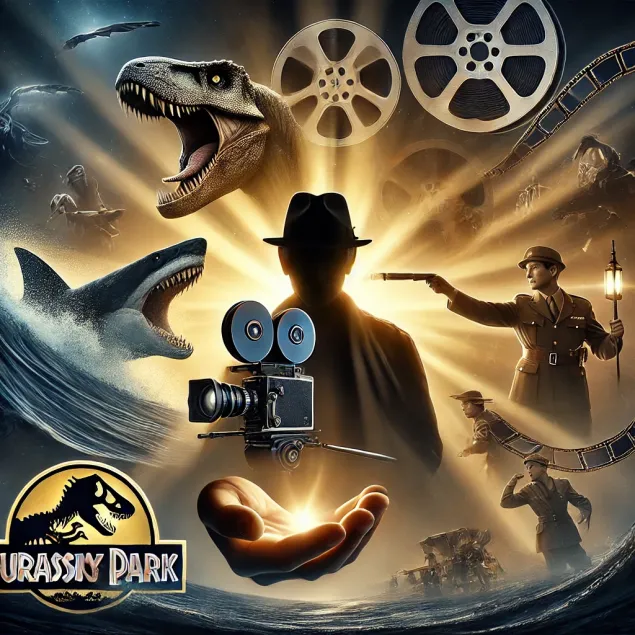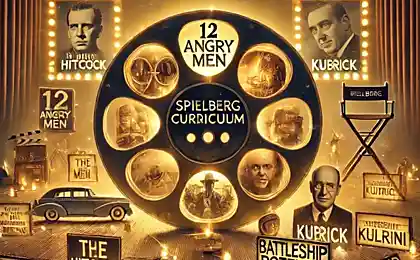162
Steven Spielberg: 10 principles of success of the brilliant director

Introduction. When it comes to the great directors of our time, Steven Spielberg has always been a leader. His influence on cinema is hard to overestimate: from Jaws, the back-end story that spawned the genre, to Jurassic Park, Schindler’s List and Saving Private Ryan. Spielberg’s career is not only a string of box office successes, but also creative courage, flexibility, deep humanism and a constant desire for novelty. But what lies at the heart of his truly phenomenal success, and what lessons can be learned not only by aspiring directors, but by anyone who aspires to leadership, innovation and continuous self-improvement?
In this article, we will look at the ten principles of Steven Spielberg, which help to unlock the secrets of his “long-lived” and legendary career. The style of the material will not be tied to specific dates or events in order to remain relevant for the long term. We rely on the opinions of experts in the field of film science, the psychology of creativity, as well as the stories of the creation of the cult films of Spielberg. Each principle is a bridge between cinema and the universal laws of success: belief in one’s own vision, perseverance, empathy, respect for the audience. Ready to learn more about this unique director and be inspired by his lessons for his projects and life? Let's go!

1. The courage to start from scratch, but aim for the great
It is known that Steven Spielberg from a young age had a passion for cinema. He shot short videos on an amateur camera and dreamed of conquering Hollywood. However, he had to overcome a number of rejections and doubts (including unsuccessful admissions to film schools). However, he did not give up, starting with documentary shorts and making his way to the big screen step by step.
- Lesson: Talent is great, but the decisive factor is the willingness to go to the goal despite doubts from above. Starting from a small area, you can gradually reach the level you dreamed of.
2. Combination of “serious” and “entertainment” content
Spielberg managed to create an elegant balance: on the one hand, a mass spectacle (E.T., Indiana Jones), on the other – films with deep content (Schindler’s List, Munich). His approach demonstrates that popularity does not necessarily imply superficiality.
- How to apply this: If you want to reach a wide audience, incorporate elements of “sightfulness” or simplicity, but don’t be afraid to add depth and socially important topics.
3. Respect for the team and partnership on equal terms
Spielberg has always stressed the importance of team spirit in his work. He chooses professionals he trusts, be it a cameraman, a composer or a special effects specialist. Instead of authoritarian rule, he prefers dialogue, values the ideas of his colleagues and creates an atmosphere in which everyone feels a contribution to the common cause.
- Why this is critical: Despite the status, a true leader understands that without the synergy of a circle of like-minded people, grandiose results cannot be achieved. For entrepreneurs and creators, this means hiring and collaborating with people willing to work in harmonious tandem.

4. Deep immersion in topic and research
The preparation for Spielberg’s films implies a significant period of research: archival materials, consultations with experts, trips to the scenes. So, for “Schindler’s List” he did a lot of work on the study of historical facts, and for “Catch Me If You Can” consulted with real FBI employees and prototype characters.
- Conclusion: Don’t underestimate “preliminary work.” A high-quality background is the key to the credibility and depth of any project, be it a film, a scientific article or a business plan.
5. Ability to take risks and try new things
Not all Spielberg projects were guaranteed to win. He took risks with fantastic plots or complex dramas beyond the usual genres. But it was the risk and constant updating of the approach that allowed him to surprise viewers.
- Council: Take the risk of moving away from the usual formulas if your inner barometer suggests that it is in the new idea that the potential lies – it creates your uniqueness.
6. Admit mistakes and move on
Like any other great director, Spielberg faced criticism and relatively less successful projects. But he didn’t dwell on failures, but took them as lessons that helped him develop. Mistakes are part of a great way to improve skills.
- Lifehack: Don’t be afraid to make a mistake, it’s better than staying put. Developing a “failed” project can provide insights that you use in subsequent successes.

7. Betting on emotion and humanism
Almost all of Spielberg's films are permeated with emotional depth, whether it's a human-alien relationship or family dramas set against a backdrop of historical conflicts. He could find in any story a human heart that resonates with viewers of any age or nationality.
- Why is that necessary? In today’s overabundance of information, people are drawn to genuine feelings rather than soulless effects. Having managed to touch the emotional side of the project, you win a loyal audience.
8. Constant technological evolution
Spielberg actively introduced innovations: computer graphics, new methods of shooting, advanced editing. He was not afraid to master and promote advanced technologies, partly pushing the boundaries of what is possible in cinema.
- Modern parallel: If you’re in business or creativity, don’t ignore tech trends like AR/VR, AI, digital marketing tools. This gives you a competitive advantage.
9. Emphasis on storytelling (art of storytelling)
One of the main secrets of every successful Spielberg film is a powerful story that touches archetypes and basic feelings. The plot is not just “twisted” for special effects, and special effects serve the plot. The director bets on exciting dramaturgy and characters of heroes, which the viewer can love.
- Lesson for us: In any business — presentations, advertising, training courses, marketing campaigns — the key to success is a story that shows how the hero (or customer, product) is transformed.

10. Professionalism and perfectionism without self-destruction
Finally, Steven Spielberg is a well-known perfectionist who is able to shoot many takes, achieving the perfect scene. However, he found a balance not by slipping into self-destructive control, but by retaining the ability to improvise and trust the team.
- Outcome: Do everything at a high level, but at the same time take care of the team and your nerves. Harmony between quality and a healthy working rhythm creates a fertile atmosphere.
Conclusion
Steven Spielberg is not just an outstanding director, personifying Hollywood and popular culture. His story is an illustration of continuous growth, the ability to correctly prioritize, move boldly and not be afraid to adapt to new trends. Looking at the 10 principles that underpin his philosophy, you can see that the secret of success combines talent, perseverance, high goals and emotional sensitivity.
Even if we don’t aspire to become blockbuster directors, these lessons help in everything from business and marketing to personal creative projects. Unusual plot, bright pitch, risk of innovation, respect for the team, technological flexibility - all these features embodied by Spielberg make his career very instructive.
We have to apply some or all of these principles in our own endeavors. After all, as practice shows, a “big” business begins with a “bold” idea and a person who is ready to invest his soul in its implementation. Steven Spielberg did just that: he did not just “make a movie”, but opened the world to new horizons of the human imagination, changing the very idea of what mass cinema can become. And isn't that proof that a combination of passion and thoughtful strategy can move us from ideas to real success?
Mark Zuckerberg: 10 principles of success in the life and business of the head of Facebook
5 King David Psalms That Inspire In Hard Times























